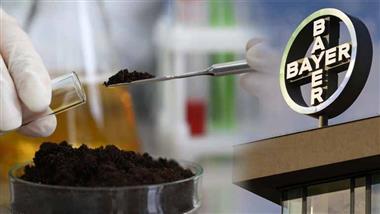by Dr. Joseph Mercola, Mercola:

STORY AT-A-GLANCE
- Bayer’s modified soil microbes could trigger a genetically engineered doomsday for agriculture
- If you don’t like the toxic pollution from industrial agriculture’s synthetic nitrogen fertilizers and pesticides, Bayer and its partner Ginkgo Bioworks have a solution
- They say they’re going to swap out some of the old fossil-fuel-based agrochemicals for genetically engineered microbes
TRUTH LIVES on at https://sgtreport.tv/
- The uncontrolled spread of genetically engineered microbes could contaminate soil on such a vast scale that it could be the end of farming!
Bayer’s modified soil microbes could trigger a genetically engineered doomsday for agriculture. Is that what Bayer wants? If you don’t like the toxic pollution from industrial agriculture’s synthetic nitrogen fertilizers and pesticides, Bayer and its partner Ginkgo Bioworks have a solution for you.
They say they’re going to swap out some of the old fossil-fuel-based agrochemicals for genetically engineered microbes. We’re no fan of pesticides and synthetic fertilizers, but let’s not jump from the frying pan into the fire! The uncontrolled spread of genetically engineered microbes could contaminate soil on such a vast scale that it could be the end of farming!
You don’t have to take our word for it, just read Ginkgo’s own report to the Securities and Exchange Commission. It’s like a sci-fi writer’s brainstorm of plots for a disaster movie:
“The release of genetically modified organisms or materials, whether inadvertent or purposeful, into uncontrolled environments could have unintended consequences …
The genetically engineered organisms and materials that we develop may have significantly altered characteristics compared to those found in the wild, and the full effects of deployment or release of our genetically engineered organisms and materials into uncontrolled environments may be unknown.
In particular, such deployment or release, including an unauthorized release, could impact the environment or community generally or the health and safety of our employees, our customers’ employees, and the consumers of our customers’ products.
In addition, if a high profile biosecurity breach or unauthorized release of a biological agent occurs within our industry, our customers and potential customers may lose trust in the security of the laboratory environments in which we produce genetically modified organisms and materials, even if we are not directly affected.
Any adverse effect resulting from such a release, by us or others, could have a material adverse effect on the public acceptance of products from engineered cells and our business and financial condition …
We could synthesize DNA sequences or engage in other activity that contravenes biosecurity requirements, or regulatory authorities could promulgate more far-reaching biosecurity requirements that our standard business practices cannot accommodate, which could give rise to substantial legal liability, impede our business, and damage our reputation.
The Federal Select Agent Program (FSAP), involves rules administered by the Centers for Disease Control and Prevention and the Animal and Plant Health Inspection Service that regulate possession, use, and transfer of biological select agents and toxins [a euphemism for bioweapons] that have the potential to pose a severe threat to public, animal, or plant health or to animal or plant products …
[W]e could err in our observance of compliance program requirements in a manner that leaves us in noncompliance with FSAP or other biosecurity rules … Third parties may use our engineered cells materials, and organisms and accompanying production processes in ways that could damage our reputation.
… [W]hile we have established a biosecurity program … to ensure that third parties do not obtain our engineered cells or other biomaterials for malevolent purposes, we cannot guarantee that these preventative measures will eliminate or reduce the risk of the domestic and global opportunities for the misuse or negligent use of our engineered cells materials, and organisms and production processes …”
Ginkgo’s SEC filing makes clear how unleashing Frankenmicrobes into the environment might wreak havoc, but if that doesn’t do it for you, this chilling true story from Dr. Elaine Ingham will. (You can also watch a short film about it at Protect Nature Now and read the original 1999 scientific publication here.)
When Dr. Ingham was an associate professor at Oregon State University, she led a study on a genetically engineered soil bacterium that changed the course of her career — and threatened all plant life on Earth.
In the 1990s, a European biotech company (I haven’t been able to figure out which one, but reports identify it as German, like Bayer and BASF), was preparing to commercialize a genetically engineered soil bacterium called Klebsiella planticola. In its natural form, K. planticola helps decompose plant matter.
The genetically modified version was intended to convert plant waste to alcohol, which could be used for fertilizer or fuel. But when Dr. Ingham and her team decided to run their own test on the alcohol-producing bacterium, they discovered that it not only killed all of the plants tested, but had the potential to kill all terrestrial plants.
Her findings ultimately prevented the genetically altered bacterium from being commercialized, but also brought about the end of her affiliation with Oregon State University, an institution funded by the biotech industry.



